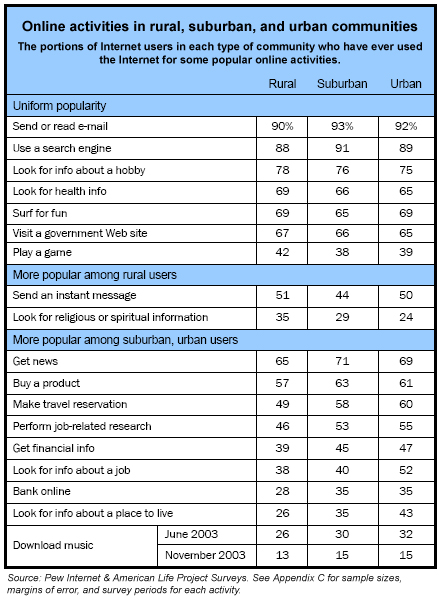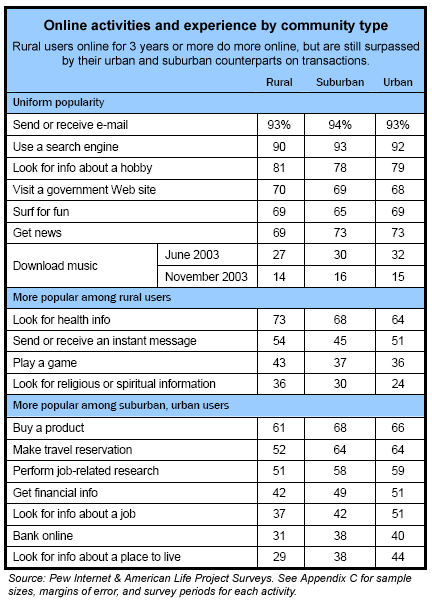Rural users have waded knee-deep into the Web.
One way to gauge how much the Internet has become part of users’ everyday lives is to examine the online activities that users pursue. In general, the Internet is less a fixture of rural residents’ lives than urban and suburban residents’ lives.
Some activities are universally popular, but transactions are less popular among rural users.
The percentage of rural users who have ever sent or read email is the same as the percentage of urban and suburban users who have done so. Moreover, on a typical day, rural users are equally likely to send or receive email than urban or suburban users. As of June 2003, about half of Internet users in each community type sent or checked their email on a typical day. Two other core activities — using a search engine and looking for hobby information — are also equally popular among rural, urban, and suburban users. And, like email usage, on a typical day, rural users are equally likely than urban and suburban users to use a search engine or seek hobby information. On a typical day, about 30% of Internet users consult a search engine, while about 20% of users in each community type look for hobby information. And when it comes to going online for no particular reason or for fun, about 23% of Internet users in each community type do so on a typical day. But rural users are less likely than urban and suburban users to get news online on a typical day. Twenty-two percent of rural users get news online on a typical day, whereas 27% of suburban users do so and 26% of urban users do so.
Rural users also participate in a number of other online activities, including online transactions. But in most cases, rural users are less likely than urban and suburban users to perform them. This is very likely connected to the fact that a relatively large number of rural Internet users are relative newcomers to the online world. As a general rule, newcomers are less likely than veterans to have performed transactions online.
Rural users are the least likely to bank online (28%), to make a travel reservation online (49%), or to buy a product online (57%). A lower proportion of rural users go online to do job-related research, and urban and suburban users are also more likely than rural users to conduct information searches for health, housing and employment. Urban users are noticeably more likely than others to have turned to the Internet when looking for a place to live (43%) or when looking for a job (52%).

The act of seeking religious and spiritual information is popular among rural users.
There are a few activities that rural users are more likely than urban or suburban users to have done online. Searching for religious or spiritual information is more popular among rural users (35%) than among suburban (29%) and urban (24%) users. In fact, among rural users, gathering religious or spiritual information is more popular than banking online (29%), looking for a place to live (26%), and downloading music (26%, June 2003). Compared to suburban users, rural users are more likely to send or receive instant messages.
Even relatively experienced rural Internet users are less likely than their urban and suburban counterparts to engage online transactions.
With experience, Internet users are more likely to do more activities online.8 Controlling for experience, the Internet is does not permeate the lives of rural users so much as it does the lives of urban and suburban users in terms of financial transactions and major life decisions, such as changing jobs or finding a new place to live.
Urban and suburban users with three or more years online remain more likely than rural users with three or more years online to engage in several activities. Even with three years of experience, rural users are less likely than urban and suburban users with the same experience to buy a product online, buy or make a travel reservation, or bank online. Rural users are also less likely to go online to look for a place to live, search for a job online, and seek out financial information. Though higher broadband penetration in urban and suburban areas may partly explain why some experienced rural users don’t do more online, a chunk (30%) of rural users with three years of experience or more have a high-speed connection.
Experienced rural users are more likely than others to send and receive instant messages, and to seek health information, and look for religious and spiritual information online.
Rural users with three years of experience don’t appear to do things much differently from the rural user population in general, but there are some things they do more often. More experienced users continue to send and receive IM at rates comparable to or greater than urban and suburban users. And among experienced users, searching for spiritual or religious information continues to be more popular among rural users (36%) than their suburban (30%) and urban (24%) counterparts. Among experienced users, those living in rural communities are more likely than others to seek out health information. About 73% of experienced rural users have sought health information online.





